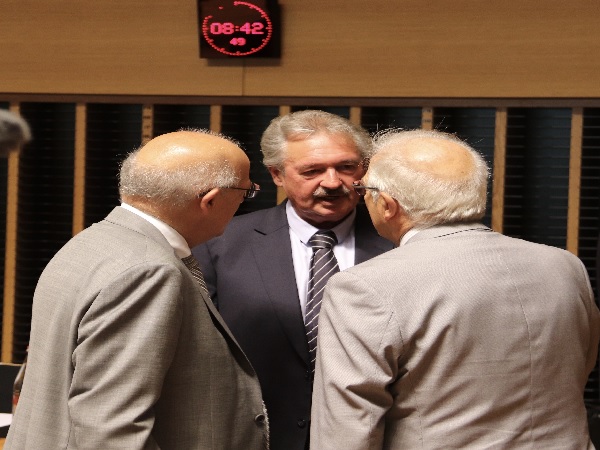 L-R: Augusto Santos Silva, Portuguese Minister for Foreign Affairs; Jean Asselborn, Luxembourg Minister of Foreign and European Affairs; Josep Borrell, Spanish Minister for Foreign Affairs, European Union and Cooperation;
Credit: MAEE
L-R: Augusto Santos Silva, Portuguese Minister for Foreign Affairs; Jean Asselborn, Luxembourg Minister of Foreign and European Affairs; Josep Borrell, Spanish Minister for Foreign Affairs, European Union and Cooperation;
Credit: MAEE
On Monday, Luxembourg hosted the European Union Foreign Affairs Council (FAC), bringing together the foreign ministers from the different EU member states.
The FAC began its session with a debate on current issues, namely pressing issues on the international agenda such as the situation in Venezuela.The Council then discussed how to improve the effectiveness of the Common Foreign and Security Policy (CFSP) in addressing the geopolitical challenges facing the EU and its member states collectively.
Foreign Ministers were joined by Defence Ministers to hold an in-depth debate on the EU's Global Strategy. This debate was an opportunity to take stock of the progress made since the presentation of the strategy in June 2016 and to reflect on the prospects for the years to come.
In this context, Luxembourg Minister of Foreign and European Affairs Jean Asselborn stressed the need to "develop a strategic and sustainable action that allows us to defend our interests while promoting our values and principles, especially human rights and the rule of law". Recalling that it is crucial for the European Union to work constantly, with its partners in all regions of the world, to strengthen effective multilateralism (with the United Nations at its centre), Minister Asselborn welcomed the fact that the Council adopted conclusions on this point.
In addition, the Minister emphasised the need to maintain "the integrated approach [...] [of] our global strategy". He recalled that Luxembourg promotes this approach through its policy of diplomacy, defence and development.
To conclude the morning session, the Foreign Ministers discussed the situation in Sudan, when the Council adopted a statement on the crisis in the country. Luxembourg condemned in the strongest terms the recent wave of violence on the streets of Khartoum during popular and peaceful demonstrations on 3 June. The country has asserted its belief that responsibility lies with the Transitional Military Council (TMC) as the authority responsible for protecting the population.
During the luncheon, the Foreign Ministers discussed with their Jordanian counterpart, Ayman Safadi, the situation in the Middle East, including the peace process, tensions in the Gulf and the situation in Syria. On this occasion, Minister Asselborn stressed the importance of Jordan as an important partner for the EU and a pole of stability in a region marked by crises: "We must continue to show solidarity and support Jordan, which continues to show tremendous generosity in welcoming millions of Syrian, Iraqi and Palestinian refugees."
Before lunch, Minister Asselborn had a bilateral meeting with Minister Safadi to take stock of news in the Middle East region, including tensions in the Strait of Hormuz and the peace process. Jean Asselborn recalled that "it must be made clear, and with one voice, that an economic peace without a political perspective can not sustainably resolve the Israeli-Palestinian conflict. The political horizon of the two-state solution is indispensable". The minister also expressed his support for the the United Nations Relief and Works Agency (UNRWA) to continue providing basic social services to millions of Palestinian refugees. In this context, the Minister informed his Jordanian colleague that Luxembourg has decided to increase its voluntary contributions to UNRWA by around 10%.








